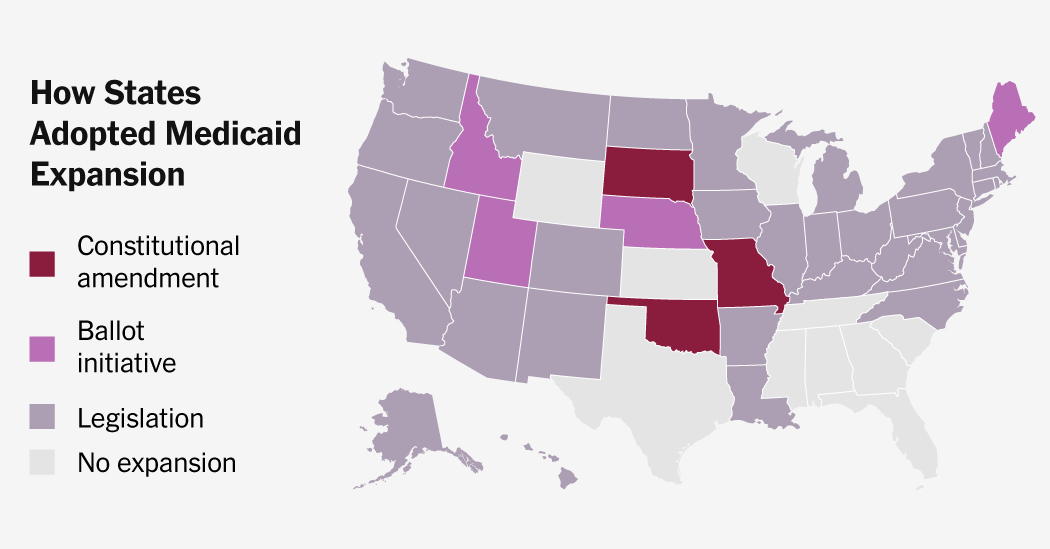Here is the plain text result:
If congressional Republicans go through with some of the deep Medicaid cuts they are considering, three states would be left in an especially tight bind. South Dakota, Missouri and Oklahoma have state constitutions requiring that they participate in Medicaid expansion, the part of Obamacare that expanded the health program for the poor to millions of adults. If Republicans choose to make the projected budget reductions by cutting into Medicaid expansion, the other 37 states (and D.C.) that participate in the expansion could stop covering working-class adults. Nine states have laws explicitly requiring them to stop Medicaid expansion or make significant changes if the federal share of spending drops.
But South Dakota, Missouri and Oklahoma can’t do that. They either need to amend their constitutions, a lengthy process that can take years, or figure out how to fill the budget hole, most likely by cutting other services or raising taxes.
The constitutional amendments were put on state ballots by progressive activists, who wanted to entrench the Medicaid program in places that had been hostile to that part of the Affordable Care Act. The idea was twofold: to get health coverage to more people, and to tether more states and their Republican lawmakers to Medicaid.
Lawmakers and policy analysts who favor cuts argue that states no longer pay their fair share of Medicaid’s bills. In recent years, the federal share of spending on the program has grown to more than 70 percent overall from around 60 percent.
The last time Republicans attempted major Medicaid changes, as part of their Obamacare repeal push in 2017, some Republican governors lobbied their senators to protect the program, and several voted against the bill. In the years since, seven more Republican-led states have expanded Medicaid by ballot measure, expanding coverage to 950,000 people.
Even after passing at the ballot, Medicaid expansion still faced opposition from elected officials charged with setting up the program. The former Maine governor Paul LePage went the furthest, claiming he would go to jail rather than carry out a Medicaid expansion.
That resistance got the progressive activists who organized and funded the ballot initiative campaigns looking for a way to make Medicaid expansion more ironclad. For 2020, they came up with the idea of pursuing voter referendums to enshrine participation in the program in state constitutions. They succeeded in Missouri and Oklahoma in 2020, followed by South Dakota in 2022.
While Mr. Hawley said he would be comfortable voting to add a work requirement to the program, he was “not going to vote for cut benefits.” Senator Mike Rounds of South Dakota has also opposed reducing federal funding for Medicaid expansion because of the financial burden it would put on states. That’s not a cost-cutting measure — that’s a cost transfer,” he told Politico in February.
Even many blue states that passed expansion through their legislatures will probably stop Medicaid coverage for poor adults if cuts go through. Twelve states, including Illinois and Virginia, have passed legislation that would automatically rescind the expansion if federal funding dips.
The states with constitutional amendments are already beginning to prepare for the possibility of a major budget hole. In Oklahoma, for example, federal Medicaid funding makes up almost 30 percent of the state’s entire budget.
But reducing Medicaid services alone probably wouldn’t be enough to offset the lost federal funding. There are only a handful of ways states are allowed to cut the program, such as ending coverage for prescription drugs or no longer providing insurance to postpartum women.
Source link




